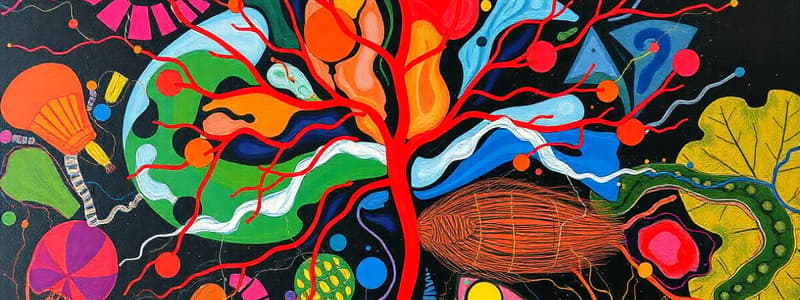Podcast
Questions and Answers
Match the following parts of the nervous system with their descriptions:
Match the following parts of the nervous system with their descriptions:
Central nervous system = Includes the brain and spinal cord Peripheral nervous system = Extends outside the skull and spinal column Somatic nervous system = Connects brain to major muscles and sensory systems Autonomic nervous system = Controls involuntary internal organs
Match the following types of nervous tissue with their characteristics:
Match the following types of nervous tissue with their characteristics:
White matter = Contains mostly myelinated axons Gray matter = Contains more cell bodies and dendrites Nuclei = A collection of neurons Fiber/Tract = A bundle of axons
Match the following protective layers of the brain with their names:
Match the following protective layers of the brain with their names:
Dura mater = Tough outermost layer Arachnoid = Spiderweb-like substance Pia mater = Delicate innermost layer Cerebrospinal fluid = Cushions the brain and spinal cord
Match the following types of nerves with their classifications:
Match the following types of nerves with their classifications:
Match the following planes of the brain with their functions:
Match the following planes of the brain with their functions:
Flashcards are hidden until you start studying
Study Notes
Central Nervous System (CNS) and Peripheral Nervous System (PNS)
- CNS includes the brain and spinal cord
- PNS encompasses all other parts of the nervous system outside of the skull and spinal column
Nervous System Components
- Nerves: bundles of axons located outside the CNS
- Somatic nervous system: connects the brain to major muscles and sensory systems
- Autonomic nervous system: controls internal organs (viscera)
- Enteric nervous system: local network of neurons governing gut function
Cranial and Spinal Nerves
- Cranial nerves: 12 pairs emerging directly from the brain (including the brainstem)
- Spinal nerves: 31 pairs emerging from the spinal cord, connecting it to the body
Autonomic Nervous System Divisions
- Sympathetic nervous system: prepares the body for action (fight or flight)
- Increases blood pressure, heart rate, and pupil dilation
- Parasympathetic nervous system: often acts in opposition to the sympathetic system (rest and digest)
Brain Planes
- Horizontal plane: divides the brain into an upper (dorsal) and lower (ventral) part
- Sagittal plane: divides the brain into right and left halves
- Medial: towards the midline
- Lateral: away from the midline
- Midsagittal: directly in the center/middle
- Coronal plane: divides the brain into front (anterior) and back (posterior) regions
Brain Tissue
- White matter: primarily composed of axons with white myelin sheaths
- Fiber/Tract: a bundle of axons
- Gray matter: contains more cell bodies and dendrites, which lack myelin
- Nuclei: a collection of neurons
Meninges
- Dura mater: tough outermost layer, Latin for "tough mother"
- Arachnoid: middle layer, resembles a spiderweb, cushions the brain
- Latin for "spiderweb-like"
- Pia mater: delicate innermost layer, adheres to the brain
- Latin for "tender mother"
Studying That Suits You
Use AI to generate personalized quizzes and flashcards to suit your learning preferences.




